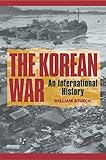The Korean War : An International History / William Stueck.
Material type: TextSeries: Princeton Studies in International History and Politics ; 68Publisher: Princeton, NJ : Princeton University Press, [1997]Copyright date: ©1995Edition: Course BookDescription: 1 online resource (496 p.) : 4 mapsContent type:
TextSeries: Princeton Studies in International History and Politics ; 68Publisher: Princeton, NJ : Princeton University Press, [1997]Copyright date: ©1995Edition: Course BookDescription: 1 online resource (496 p.) : 4 mapsContent type: - 9780691016245
- 9781400821785
- 951.9042
- DS918 .S819 1995
- online - DeGruyter
- Issued also in print.
| Item type | Current library | Call number | URL | Status | Notes | Barcode | |
|---|---|---|---|---|---|---|---|
 eBook
eBook
|
Biblioteca "Angelicum" Pont. Univ. S.Tommaso d'Aquino Nuvola online | online - DeGruyter (Browse shelf(Opens below)) | Online access | Not for loan (Accesso limitato) | Accesso per gli utenti autorizzati / Access for authorized users | (dgr)9781400821785 |
Browsing Biblioteca "Angelicum" Pont. Univ. S.Tommaso d'Aquino shelves, Shelving location: Nuvola online Close shelf browser (Hides shelf browser)

|

|

|

|

|

|

|
||
| online - DeGruyter The Chinese Reassessment of Socialism, 1976-1992 / | online - DeGruyter The State and the Rule of Law / | online - DeGruyter The Permanence of the Political : A Democratic Critique of the Radical Impulse to Transcend Politics / | online - DeGruyter The Korean War : An International History / | online - DeGruyter Isolationism Reconfigured : American Foreign Policy for a New Century / | online - DeGruyter Wild Lily, Prairie Fire : China's Road to Democracy, Yan'an to Tian'anmen, 1942-1989 / | online - DeGruyter Paolo Giovio : The Historian and the Crisis of Sixteenth-Century Italy / |
Frontmatter -- Contents -- List of Maps -- Acknowledgments -- Introduction -- Chapter 1. The Origins Of The Korean War -- Chapter 2. The Diplomacy of Confrontation and Consolidation -- Chapter 3. Diplomacy Fails: The UN Counteroffensive and Chinese Intervention -- Chapter 4. Limiting the War -- Chapter 5. The Dimensions of Collective Action -- Chapter 6. Armistice Talks: Origins and Initial Stages -- Chapter 7. Progress -- Chapter 8. Deadlock -- Chapter 9. Concluding An Armistice -- Chapter 10. The Korean war as International History -- Notes -- Bibliography -- Index
restricted access online access with authorization star
http://purl.org/coar/access_right/c_16ec
This first truly international history of the Korean War argues that by its timing, its course, and its outcome it functioned as a substitute for World War III. Stueck draws on recently available materials from seven countries, plus the archives of the United Nations, presenting a detailed narrative of the diplomacy of the conflict and a broad assessment of its critical role in the Cold War. He emphasizes the contribution of the United Nations, which at several key points in the conflict provided an important institutional framework within which less powerful nations were able to restrain the aggressive tendencies of the United States. In Stueck's view, contributors to the U.N. cause in Korea provided support not out of any abstract commitment to a universal system of collective security but because they saw an opportunity to influence U.S. policy. Chinese intervention in Korea in the fall of 1950 brought with it the threat of world war, but at that time and in other instances prior to the armistice in July 1953, America's NATO allies and Third World neutrals succeeded in curbing American adventurism. While conceding the tragic and brutal nature of the war, Stueck suggests that it helped to prevent the occurrence of an even more destructive conflict in Europe.
Issued also in print.
Mode of access: Internet via World Wide Web.
In English.
Description based on online resource; title from PDF title page (publisher's Web site, viewed 30. Aug 2021)


